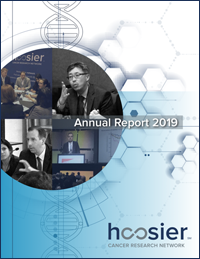As a member of the Hoosier Cancer Research Network, I am grateful to collaborate with outstanding investigators in the development of multi-center, investigator-initiated clinical trials. I’ve seen the value of this collaboration throughout my own professional development: from my oncology fellowship under the mentorship of Dr. Larry Einhorn and Dr. Nasser Hanna to my current role as a lead investigator for a number of early-stage therapeutic clinical trials. HCRN has been a trusted and valuable resource every step of the way. In my new role as HCRN’s chief scientific officer, it is my goal to ensure HCRN’s research portfolio continues to reflect the scientific excellence and relevance for which it is highly regarded.
This mark of excellence begins and ends with the community of veteran thought leaders and young investigators — from leading cancer centers across the United States — who participate in HCRN’s Clinical Trial Working Groups. Our members bring their expertise, a passion for discovery, and the conviction that we do our best work in the company of our peers. Within the context of Clinical Trial Working Groups, these investigators share a common purpose: to develop the next generation of clinical trials that will lead to safer, more effective treatments for our patients, and improved quality of life for cancer survivors.
 So, how do we move from aspiration to achievement? I believe HCRN has answered this question exceptionally well through its clinical trial development and management processes.
So, how do we move from aspiration to achievement? I believe HCRN has answered this question exceptionally well through its clinical trial development and management processes.
It begins when an investigator submits a Letter of Intent to Hoosier Cancer Research Network. The investigator presents the study concept to their Clinical Trial Working Group peers, where group members provide valuable feedback on design, objectives, eligibility, feasibility, funding, and other critical aspects of the study.
Once a working group has approved an LOI, the study concept moves into an intense period of development. HCRN staff assist the sponsor-investigator with the development of the study protocol and informed consent, while contracting and regulatory discussions take place between the sponsor-investigator’s institution, study funders, and HCRN. Feasibility surveys are conducted to identify the best participating sites for the trial, and regular teleconferences begin to keep all study teams apprised of the study’s development.
 As development and contract negotiations conclude, the HCRN data team finalizes a custom EDC for the study, while regulatory staff support the sponsor-investigator’s IND submission and prepare documents for IRB review. Finally, as the study is activated, HCRN provides all necessary training to participating sites, and ongoing project, data, safety, regulatory, and correlative management throughout the life of the study.
As development and contract negotiations conclude, the HCRN data team finalizes a custom EDC for the study, while regulatory staff support the sponsor-investigator’s IND submission and prepare documents for IRB review. Finally, as the study is activated, HCRN provides all necessary training to participating sites, and ongoing project, data, safety, regulatory, and correlative management throughout the life of the study.
HCRN’s support continues through final publication of the study. But as those who have led clinical trials know all too well, the completion of a study is rarely the end of the story, as study results lead to new lines of inquiry. With this reality in mind, HCRN integrates planning for correlative sample collection and future research at the earliest stages of study development.
As HCRN’s 2019 Annual Report demonstrates, researchers delivered significant accomplishments in 2019. I am thankful to each member for their contributions and look forward to our continued work together.
– Shadia I. Jalal, MD, chief scientific officer, Hoosier Cancer Research Network; associate professor of medicine, Indiana University School of Medicine
About Hoosier Cancer Research Network:
Hoosier Cancer Research Network (formerly known as Hoosier Oncology Group) conducts innovative cancer research in collaboration with academic and community physicians and scientists across the United States. The organization provides comprehensive clinical trial management and support, from conception through publication. Created in 1984 as a program of the Walther Cancer Institute, Hoosier Cancer Research Network became an independent nonprofit clinical research organization in 2007. Since its founding, Hoosier Cancer Research Network has conducted more than 210 trials in a variety of cancer types and supportive care, resulting in more than 350 publications. More than 8,500 subjects have participated in Hoosier Cancer Research Network clinical trials.

